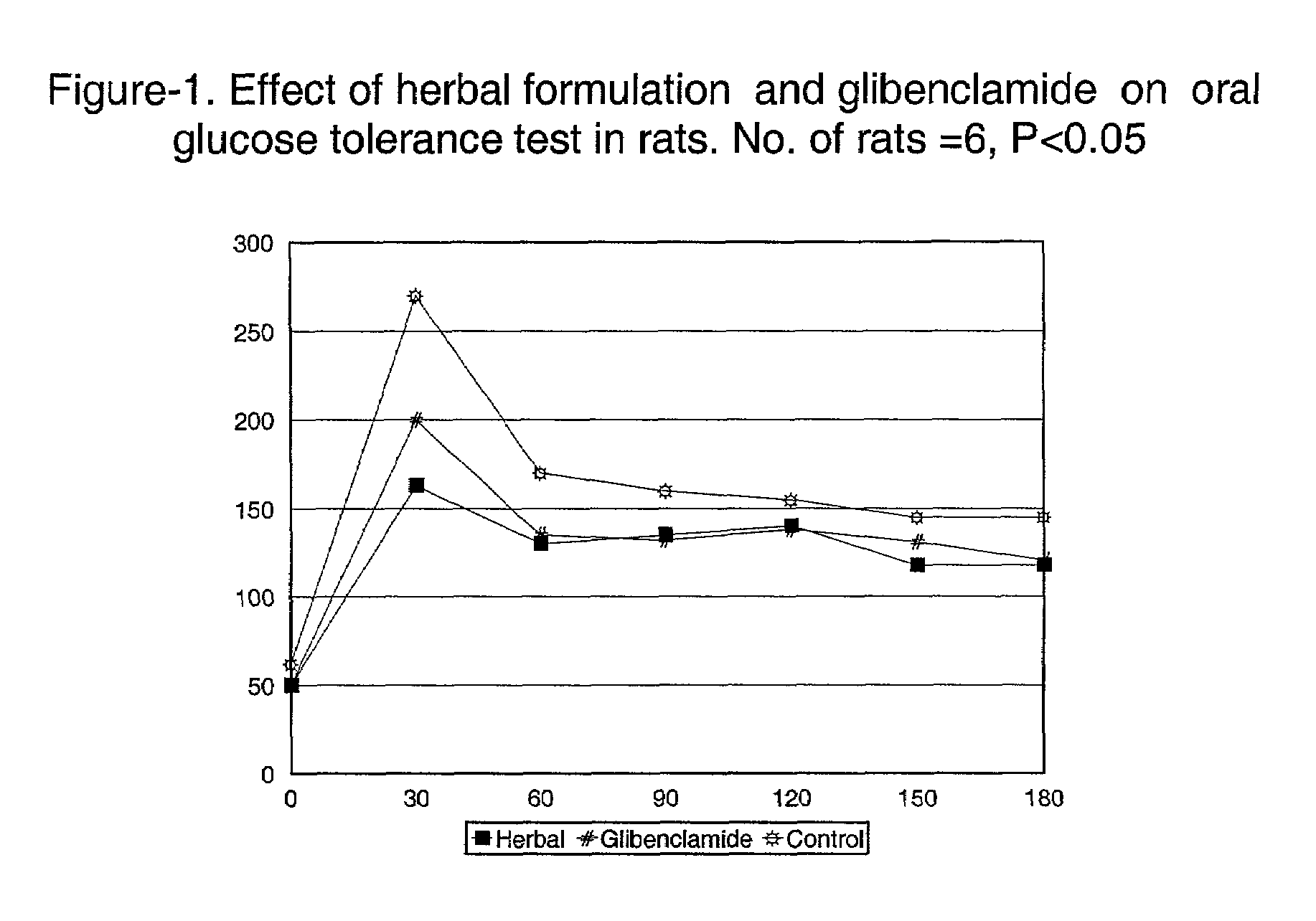Therapeutic/edible compositions comprising herbal ingredients and methods for treating hyperglycemia
a technology of herbal ingredients and compositions, applied in the field of edible or medicinal herbal compositions, can solve the problems of sugar not being properly metabolized to produce energy, and deteriorating of the pancreas gland
- Summary
- Abstract
- Description
- Claims
- Application Information
AI Technical Summary
Benefits of technology
Problems solved by technology
Method used
Image
Examples
example-1
[0025]Male albino rats of wistar strains (150–200 g) were used throughout the studies. Rats were divided into eleven groups of each containing 6 rats. These animals were randomly assigned to the following groups which include (A) control group, (B) standard group (glibenclamide, 3 mg / Kg) and (C) test groups (F1–F9). Diabetes was induced by injecting streptozocin (STZ) in a dose of 65 mg / kg intra venous in 0.1M citrate buffer. Rats were kept fasted overnight but were given water ad libitum. After 48 hours of STZ injection, blood samples were taken from tail vein of conscious rats. The blood was centrifuged at 5000 rpm for 10 minutes in an eppendorf tubes containing EDTA (1 mg / ml of blood). Plasma glucose estimations were done by glucose oxidase method by using Auto blood analyzer (Techinicon RA-100, Bayer Diagnostics, Ireland). Animals with blood glucose level more than 250% of the fasting level were considered to be diabetic and were used for the experiment. Group A was given normal...
example-2
Glucose Tolerance Test (GTT)
[0028]From the above STZ induced diabetic model the composition 1 has chosen for GTT study.
[0029]Male albino rats of wistar strains (150–200 g) were used. They were divided into three groups each containing 6 rats. They were randomly assigned A) control group B) standard group (glibenclamide) C) test group. Group A was given saline, group B was given glibenclamide (3 mg / Kg) and group C was given test compositions. After 2 hours all rats were loaded with glucose with a dose of 5 g / kg. Blood samples were taken from tail vein of conscious rats for every 30 minutes up to 3 hours. Plasma glucose estimations were done by glucose oxidase method by using Auto Blood Analyzer as described in FIG. 1. The statistical analysis was performed using Prism program (Graphpad software). Annova with post Newman—Keul test with P values was used to compare the treatment efficacy between the test groups.
[0030]Although activity of the test composition is significantly higher, bo...
example-3
[0031]In this example the composition-1 was tested on humans. Five non-insulin dependent diabetic male patients aged 45–55 years old and an average body weight of 68±5 kg were given composition F1 at a dose of 0.1 gm / Kg for 30 days daily in 3 divided doses, half and hour before breakfast, lunch and dinner. The fasting blood glucose level was monitored for every five days starting from day zero. The results of this test are shown in table-3. Considerable reduction in the blood glucose levels were observed in all the individuals although the response varied significantly. It is concluded that some changes in dosage regime and diet would give a proper control of diabetes in non-insulin dependent diabetic patients. It is assumed that, these herbal compositions could be used in type I diabetic patients along with insulin therapy as ingredients of this compositions could increased peripheral insulin sensitivity, and hence insulin dose could be reduced.
[0032]
TABLE 3Effect of herbal composi...
PUM
 Login to View More
Login to View More Abstract
Description
Claims
Application Information
 Login to View More
Login to View More - R&D
- Intellectual Property
- Life Sciences
- Materials
- Tech Scout
- Unparalleled Data Quality
- Higher Quality Content
- 60% Fewer Hallucinations
Browse by: Latest US Patents, China's latest patents, Technical Efficacy Thesaurus, Application Domain, Technology Topic, Popular Technical Reports.
© 2025 PatSnap. All rights reserved.Legal|Privacy policy|Modern Slavery Act Transparency Statement|Sitemap|About US| Contact US: help@patsnap.com

